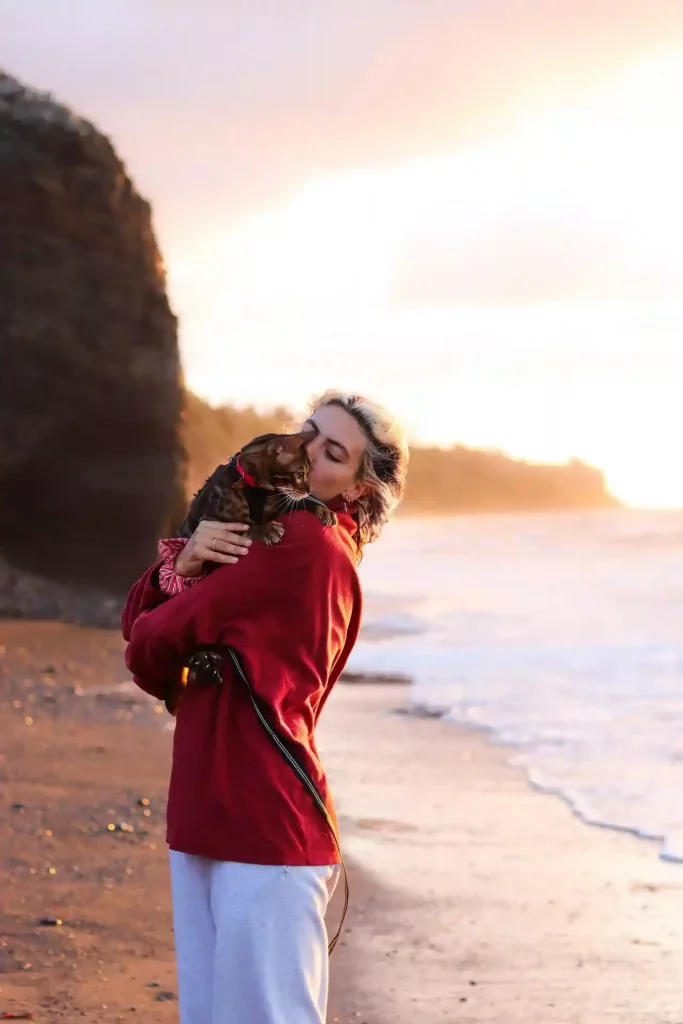Whether you live near a beach or are going on a day out to some beaches, walks like this are an incredible treat for cats and kittens of all ages, shapes and sizes. Whether it be a warm summer or a brisk winter, beaches can be an exciting and invigorating place for cats, and lets you change up your usual walking routine too.
But what exactly are the risks of taking young cats to beaches, and is it ok to take a kitten to the beach due to the stage of vaccinations they are at?
We took our English kitten out when she was younger, and didn’t really think too much about it at the time. Thankfully she had no problems at all, but that won’t always be the case – I decided to write down my thoughts with some tips on taking a kitten to the beach this year.
Can kittens go to a beach? It is ok take a kitten to a beach but providing they have had their shots and vaccinations. Vets typically recommend you wait 10-14 days (approximately two weeks) after your kitten’s latest vaccination booster. At this stage, they are usually around 16 weeks or 4 months old.

However, even when your cat is a kitten or even older than this, it is still extra important to be extra careful around beaches. And it’s not just the adult cats and beach water itself that can carry disease and risks to kittens, but also the weather that could harm them.
The good news is that all these issues at a beach can be solved simply taking steps to protect them, such keeping them on a short lead and ensuring that you don’t let them out of your sight.
But let’s talk about shots and vaccinations in a little more depth first.
Can I take my kitten to the beach without shots?
How important exactly are vaccinations and shots for kittens going to a beach? Is this a risk you should take, after all, what are the chances of your kitten getting ill really?
Please don’t take risk and take kittens to a beach without shots, and here’s why…
Can unvaccinated kittens go to a beach? The short answer to this is no, you should not take your kittens to a beach day out before vaccinations and without shots. Beaches can be busy places with lots of different cats (some unvaccinated) where the risk of potentially fatal parvovirus (parvo) is higher.
So, why exactly is it not safe for unvaccinated kittens to go to the beach due to parvo? Well, if your kitten hasn’t had shots, they can easily pick up illnesses and diseases either from the environment or from another cat.
Parvovirus, or parvo is the biggest risk for kittens in an environment like the beach with other cats running about. It’s a deadly disease that usually strikes unvaccinated kittens and is highly infectious between cats.
It causes an infectious gastrointestinal (GI) illness in kittens and is usually spread through faeces and is potentially fatal. Kittens without their shots are particularly prone to getting it.

Yes, you read that right. The parvo disease can survive in beach sand!
So, even if you were to take your kitten to the beaches alone, there is still a considerable chance of them getting parvo through the sand if they have not had their vaccination shots.
Scary stuff.
In order to protect your kitten from the deadly risk that is parvo and other problematic diseases, it is best for their welfare that they avoid environments like beaches until they are fully vaccinated from 8 weeks and onwards (you can see a vaccination schedule lower down the page).
By ensuring your kitten is fully vaccinated with shots before letting them loose in a beach environment, you are protecting them from serious diseases such as parvo or anything else they might catch from the environment or any other unvaccinated cat.
Although it might be tempting to take them out before and not wait the appropriate amount of time, these vaccinations will only be effective if the guidance given to you about it is strictly adhered to.
The vaccination process for kittens
There are two main types of vaccination for your kitten which you will have to get throughout the vaccination process – this is the C3 and C5 vaccination.
- The C3 vaccination covers your kitten against hepatitis viruses, distemper and parvovirus.
- The C5 vaccination covers your kitten against all of the above – distemper, parvovirus and hepatitis viruses – as well as shelter cough.
There are three main vaccinations that your kitten needs before being fully protected from diseases, and they need to at a certain age (in weeks) to have them.
6 to 8-week vaccinations
The first vaccination should be the C3 vaccination. Although your kitten should already have had this before they were given to you, this might not have been the case.
If you haven’t been given the paperwork or haven’t been clearly told about whether they’ve been vaccinated, book this in immediately.
Can I take my 8-week-old kitten to the beaches? As this is only their first vaccination and all the shots are not yet complete, I do not recommend you take your 8-week-old kitten to the beaches just yet. You should wait until all shots are completed.
Similarly, I would not recommend you take a 9-week-old kitten to a beach given it’s still in the early stages of the vaccinations process.
10 to 12-week vaccinations
The second vaccination should be the C5 vaccination, which not only protects your pop from parvovirus, hepatitis viruses and distemper – but also protects them against cat shelter cough.
After the second booster you can start toilet training your cat outdoors or take them on short walks.
Can I take my 10 week old kitten to the beach? After the second set of shots, your 10 week old kitten can go on short walks. However, it is still advisable to avoid beaches until they have been given their third and final booster.
14 to 16-week vaccinations (optional)
At this point, you can choose whether or not your kitten can have C3 or C5 for their final booster – although your vet can help to advise you on this decision.
After they’ve had their final booster, you should wait around two weeks until you can safely take them to areas such as a beach.
Your kitten should now be fully safe from viruses and diseases that can be picked up from other cats… but there are still some other risks associated with this environment you should consider.
Are beaches safe for kittens?
You might be wondering whether beaches are the safest environment for your kittens, especially since they are still growing and developing. Even if your kitten is fully vaccinated, there are a number of factors to consider before letting your pet loose on a beach.
So, before you take your kitten out on their first beach side walk, it is important to consider the following risks.
1. Sunburn or sunstroke
When it’s a sunny day, it is natural to want to flock to the beaches. You’re probably wondering that if humans get to enjoy the beaches on a sunny day, why can’t your kitten too?
Whilst you’re completely right to think that, an open environment like a beach can cause sunburn in man as well as cat. If cats are walking on the hot promenade or the sand, they might end up burning their tummy and feet.
The best way to protect them is by preventing them in the first place – many pet shops, vets and other outlets sell specialized catty sunscreen, which will help to prevent them from getting burnt.

Furthermore, if they are out in the sun too long without any shade or hydration, they might end up developing sunstroke. Be sure to not walk them in the direct sunlight too long, favouring shady areas. You should also check how hot the sand is for them to walk on too!
Also, be sure to bring a portable water bowl and bottle with you – stopping your kitten for regular drinks to prevent them from becoming too dehydrated with the heat.
By doing this, you will be able to drastically reduce the chance of your kitten getting sunstroke, but to reduce it further you should consider only going on walks during dawn and dusk, when the sun is less intense.
2. Sand in the eyes and stomach
As well as sand potentially getting hot and burning your kitten, the fine grit can also be problematic. Some US beaches have sand and this could get stuck in their eyes, which could cause them to stream and potentially get infected.
The glare of the sun can also be harmful, which is why we always pack catty sunglasses on hot days to protect against the rays and sand.
If your kitten does get sand in their eye you can try and flush out the grit with warm water or specialised catty eye drops. Or, if all else fails, please take them to vet.
Another risk is sand impaction. It can get into the stomach of your kitten – mostly when they start digging. If swallowed, sand can become impacted in their insides and create blockages. Obviously, this is a time to call the vet!
3. Strong swells and deep water (can kittens go in beach water)
Beaches can be an exciting place for kittens, but you can’t expect them to swim with the same ease as older cats.
With strong swells and deep water, it is easy for things to get out of control. That’s why it is good to keep kittens on a short lead when near the water, with your eyes on them at all times.
If you really don’t want to take any risks, I would recommend buying a life jacket for your kitten to use at the beaches safely.
Alternatively, just keep them by the edge of the water without actually letting them go into it. If you want to teach your kitten to swim, there are several organisations that offer specialised kitten swimming lessons.
4. Weeds, dead fish, and pollution
These 3 hazards are just a few of the risks your kitten can encounter at the beaches. Here a little info on each one, and reasons why beaches are not always safe for kittens.
- Weed dangers: Most beaches are safe for cats but the wild and dry weed you may find can be dangerous when ingested.
- Dead fish dangers: Your kitten will be enticed by the smell of dead fish, and who can blame them. However, dead fish can contain deadly toxins that could poison your kitten.
- Pollution dangers: Don’t let your kitten drink water.
5. Hazards buried in the sand
Unfortunately, not everybody is as thoughtful at the beaches as we are. There are plenty of dangers lurking under the sand that could hurt your kitten, for example:
- Broken glass bottles.
- Metals and plastics washed up.
- Fishing hooks and line
- Old food that has been left in the sun.
Conclusion
In short, what we should be asking is not if kittens can go to the beach – it’s if unvaccinated kittens can go to the beach. It’s important to keep your kitten socialized and start that early, but not at the risk of their health. Be sure to talk to your vet if you have any questions, and happy adventures!
However, as well as the issue over shots, you should also consider whether your local beaches are safe for kittens. Beaches can come with plenty of hazards, so please do prepare properly and keep your kitten safe.



Leave a Comment